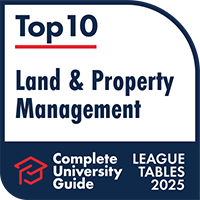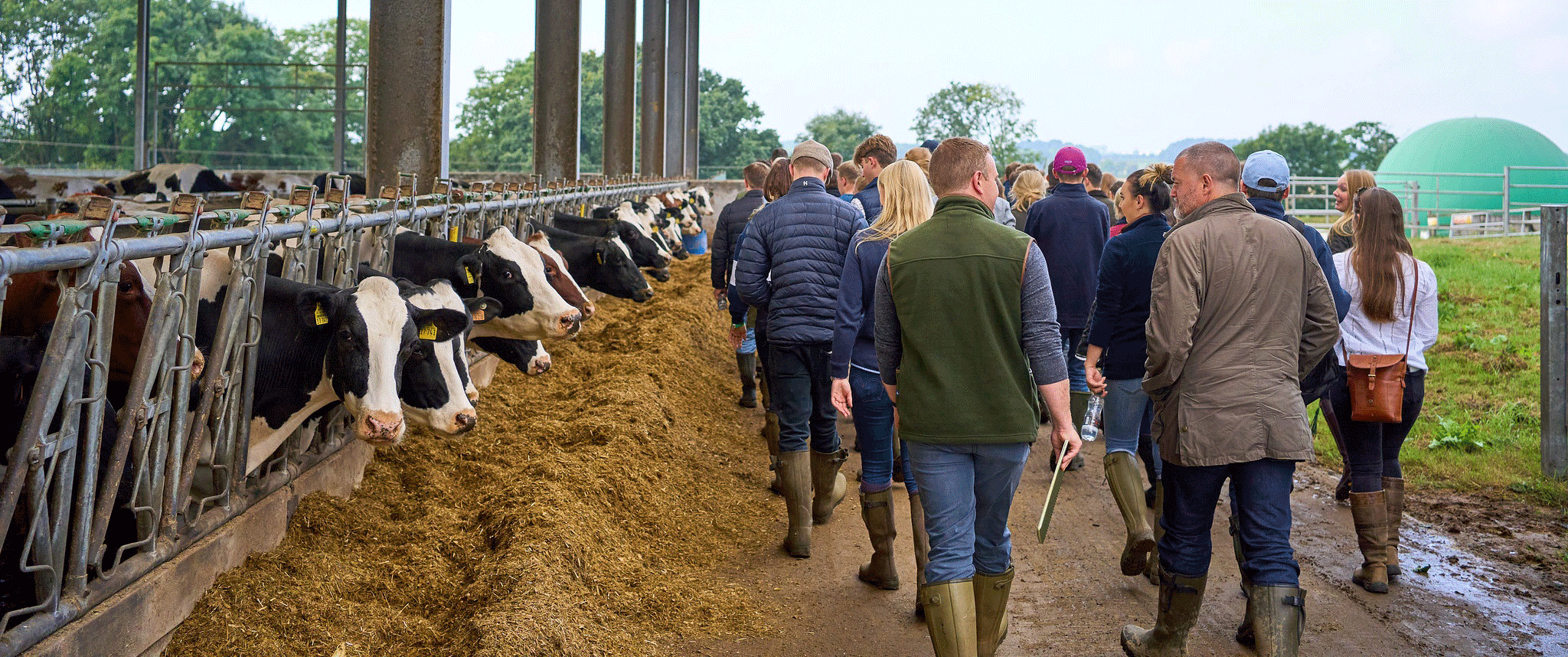BSc (Hons) Real Estate
This honours degree course gives you the opportunity to examine the complexities of the market for the following sectors: commercial, residential, industrial and leisure property, both in the UK and overseas.
Course overview
Graduates have fulfilled roles at prestigious companies such as Knight Frank, JLL, CBRE, Deloitte Real Estate, Dalcour Maclaren, Savills, the Valuation Office Agency, and many more.
"100% in work or doing further study 15 months after the course"
Graduate Outcomes Survey 2025
Accredited by the Royal Institution of Chartered Surveyors (RICS), this course is the perfect entry into professional commercial real estate or other sectors depending on your career aspirations. You will learn about acquisitions, sales, commercial lettings, development and management of property interests and investments, town and country planning, law of property and building construction. You will develop an essential understanding of sustainability and wider business management to enable you to provide effective advice.
The curriculum enables future specialism as you enter the workplace. You will cover commercial rural and urban property issues. Pursuing a career in commercial or residential property, our Real Estate degree will develop technical and professional skills, networks and confidence.

If you are interested in finding out more about the Royal Institution of Chartered Surveyors (RICS), they have produced this short video highlighting their work.
Work placement
You will complete a period of work experience as an assessed part of your course. Our Careers Team run a careers fair each year, providing an opportunity for you to meet potential employers, There is also an option of a full placement year.

Course content
Modules are divided into three streams: Property, Land Use and Development and Business. You will learn through lectures, smaller group tutorials, visiting lecturers from professional practice, practical sessions, study visits and real-life case studies as well as completing a Research Project in a subject area of specific interest.
A part-time or distance learning route to study is available.
Timetables
Please note that while we make every effort to ensure that timetables are as student-friendly as possible, scheduled teaching can take place on any day of the week. Wednesday afternoons are normally reserved for sports and societies activities.
Modules
Each module is worth a specified number of credits. Each credit equates to 10 hours of total study time. Total study time includes scheduled teaching, independent study and assessment activity.
Full-time students normally take modules worth 60 credits per 15 week semester but this can vary depending on your elective choice. Part-time students taking proportionally fewer credits per semester. All students take a total of 120 credits per level and 360 credits for the degree as a whole. Your overall grade for your degree is based on marks obtained for modules taken at level 5 and level 6 (weighted 30:70 accordingly).
The modules available for this degree are shown below. They may change for your year of study as we regularly review our module offerings to ensure they’re informed by the latest research and teaching methods.
Year one
- 4L001 Building Technology and Regulation: This module introduces students to the fundamental principles of building science, construction methods, and building regulations in England and Wales. It explores the evolution of traditional and modern construction technologies, with a focus on sustainability, accessibility, and regulatory compliance. Students examine structural principles, building materials, and services across domestic, commercial, and rural contexts. Assessment includes a multiple-choice online test, a 1500-word technical portfolio, and a 2000-word problem sheet. The module supports critical understanding of construction efficiency, sustainable practices, and regulatory frameworks.
- 4L002 Foundations of Law: This module provides a comprehensive introduction to the English legal system, essential for future study in Land Law. It covers sources of law, contract and tort law, legal research, and dispute resolution. Students develop skills in legal analysis and professional communication relevant to property management. Assessment includes a multiple-choice online test, a 1500-word essay, and a 2000-word professional practice report. The module supports legal literacy, critical thinking, and professional advisory skills.
- 4L003 Property Valuation and Appraisal: This module introduces students to the principles and methods of property valuation and appraisal, including investment analysis and sustainability considerations. It covers valuation techniques, professional standards (RICS), and the use of valuation tables and measurement codes. Students apply theoretical knowledge to real-world scenarios across various property types. Assessment includes a 1500-word problem sheet and a two-hour written exam. The module supports technical competence, professional communication, and sustainable thinking in valuation practice.
- 4B001 Practical Business, Finance and Accounts: This module introduces students to financial principles in agri-business and rural enterprise contexts. It covers financial statements, budgeting, investment appraisal, and decision-making tools. Students develop analytical and communication skills essential for interpreting financial data and planning business strategies. Assessment includes a 2000-word problem sheet and a 2000-word professional practice report. The module supports financial literacy, business planning, and critical evaluation of enterprise performance.
- 4L004 Property Markets and Analysis: This module explores real estate markets, focusing on transactions, market data analysis, and negotiation. Students examine legal frameworks, economic influences, and commercial awareness across property sectors. Practical skills in negotiation and market interpretation are developed using real-world data and scenarios. Assessment includes a 5-minute narrated presentation and a 15-minute role-play negotiation exercise. The module supports understanding of market dynamics, professional communication, and deal-making.
- 4M002 Professional, Practical and Study Skills: This module develops academic, employability, and practical skills for success in university and land-based careers. It includes reflective writing, data handling, digital literacy, and hands-on tasks relevant to the sector. Students explore sustainability, industry challenges, and professional development. Assessment includes a skills portfolio, a 1000-word reflective account, and a group presentation on a sustainability challenge. The module supports self-awareness, technical competence, and a sustainable mindset.
Year two
- 5L001 Land and Property Law: This module deepens students’ understanding of land and property law, focusing on legal estates, interests, and landlord-tenant relationships. Topics include conveyancing, easements, covenants, co-ownership, and tenancy law. Students apply legal principles to real-world property management scenarios. Assessment includes an 1800-word professional practice report, a multiple-choice online test, and an 1800-word problem sheet. The module supports the development of legal reasoning, client advisory skills, and professional communication.
- 5L002 Valuation Appraisal and Building Pathology: This module integrates valuation techniques with building pathology, enabling students to assess property value in relation to building condition, obsolescence, and market trends. Students explore valuation methods, building defects, and the impact of legislation on property values. Assessment includes two 2000-word professional practice reports, one of which is a Red Book valuation. The module supports technical competence in surveying, critical analysis, and professional reporting.
- 5L003 Property Finance, Business and Taxation: This module introduces students to property finance structures, taxation, and business planning in rural and urban contexts. Topics include development finance, capital appraisal, national and local taxation, and the reuse of farm buildings. Assessment includes two 1500-word professional practice reports and a 5-minute group presentation. The module supports financial literacy, strategic thinking, and understanding of taxation impacts on property decisions.
- 5L004 Planning and Development: This module explores the planning and development process in rural and urban contexts, focusing on policy, law, sustainability, and site assessment. Students examine the National Planning Policy Framework, land measurement, planning applications, and emerging technologies. Assessment includes a 1600-word skills portfolio with artefacts and a 2400-word professional practice report. The module supports critical understanding of planning systems, technical competence, and client advisory skills.
- 5M002 Research and Evidence: This module develops students’ ability to design and justify research proposals using both quantitative and qualitative methods. Topics include study design, data analysis, ethics, and communication of findings. Students engage with real-world problems and explore research applications across disciplines. Assessment includes a 2500-word research proposal and a 2-hour online test. The module supports evidence-based thinking, analytical skills, and preparation for the Level 6 dissertation.
- 5L005 Property Management and Agency: This module covers the management and agency of residential and commercial property, including landlord-tenant law, lease management, marketing, and compliance. Students explore professional standards, agency operations, and client relationships. Assessment includes a 10-minute group presentation and a 2800-word professional practice report. The module supports professional communication, regulatory understanding, and strategic thinking in property transactions.
- 5M001 Industry Engagement: This module provides students with a structured industry placement to develop professional, technical, and reflective skills in a real-world context. Students complete a minimum of 444 hours of work-based learning aligned to their career goals. Assessment includes a CV and personal statement (500 words) and a reflective portfolio (1000 words). The module supports employability, self-awareness, and the application of academic knowledge in professional settings.
Year three
In the third year, you will complete a research dissertation on a subject of your choosing, and select two elective modules to suit your specialist areas of interest.
- 6L001 Commercial Property Management: This module explores the principles and practices of managing commercial property in rural and urban contexts. Topics include lease management, service charges, tenant selection, repairs, planning, and professional ethics. Students examine how property management aligns with client investment objectives. Assessment includes two 2000-word professional practice reports. The module supports technical competence, strategic thinking, and preparation for RICS membership.
- 6L002 Utilities and Infrastructure: This module examines statutory valuation, compulsory purchase, and infrastructure development across sectors such as transport, energy, and digital networks. Students explore valuation methods, legal frameworks, and compensation assessment. Topics include leasehold reform, planning compensation, and dispute resolution. Assessment includes a 1000-word audio-visual presentation, a 2800-word professional practice report, and an online test. The module supports applied valuation skills, legal understanding, and professional advisory competence.
- 6M001 Research Project: This module enables students to undertake an independent research project aligned with their subject area. Students develop a research question, design a methodology, and collect and analyse data. Support is provided through supervision and workshops. Assessment includes a 5-minute presentation and a 12,000-word thesis or equivalent multimedia portfolio. The module supports critical thinking, research skills, and evidence-based recommendations.
Plus a choice of TWO electives selected from a broad range, including:
- 6L003 Forestry and Natural Resources: This module examines woodland and natural resource management in rural and urban contexts. Students explore tree identification, silviculture, ecosystem services, and natural capital. Emphasis is placed on sustainability, biodiversity, and balancing timber production with environmental benefits. Assessment includes a 2400-word woodland management plan and a 1600-word portfolio of artefacts. The module supports applied ecological knowledge, critical thinking, and sustainable land use planning.
- 6L004 Advanced Residential Agency: This module explores the sale and marketing of residential property, including legal frameworks, valuation, and agency operations. Students examine statutory compliance, marketing strategies, and the use of digital tools such as CRMs and property portals. Topics include vernacular architecture, new homes, and sustainability in housing. Assessment includes a 5-minute individual presentation and a 3200-word professional practice report. The module supports technical competence, communication, and innovation in residential agency.
- 6B001 Changing Consumer Behaviour: This module investigates the psychological, social, and cultural drivers of consumer behaviour, with a focus on promoting sustainable consumption. Students explore theories from multiple disciplines and apply them to real-world marketing and behaviour change strategies. Assessment includes a 1600-word annotated bibliography and a 2400-word essay. The module supports critical evaluation of consumer society, ethical marketing, and the development of behaviour change interventions.
The availability of electives to individual students will be dependent on timetabling considerations and on sufficient students electing to take part.
Disclaimer information
The University has established various rules and regulations that you must agree to and follow if you accept an offer to study with us. View our full disclaimer notice.
Careers and graduate destinations
You will gain the knowledge, understanding and skills to practice within the following sectors:
- Valuation and surveying
- Property investment and asset management
- Residential and commercial agency
- Town and country planning
- Commercial and residential property management
"The course opens many opportunities within both the urban and rural property industry, and once you have a degree many more employment opportunities are made available, even if you decide to go into another industry post-graduation."
Daniella Sowden, Graduate
Entry requirements
Typical offers
Required: GCSE minimum five GCSEs at Grade C/4 including English Language and Mathematics (or Maths Numeracy for Welsh applicants) plus satisfactory level 3 qualifications:
- A-Level: (Example grades BCC) – minimum of 104 UCAS tariff points (points to be across three A-Levels or equivalent qualifications)
- C&G Advanced Technical/BTEC - Level 3 Extended Diploma (1080) at Distinction-Merit-Merit
- C&G NPTC/C&G Advanced Technical/BTEC - Level 3 Diploma (720), Extended Certificate (360) and 90-Credit Diploma (540) acceptable when accompanied by other Level 3 qualifications
- International Baccalaureate: 26 points
- Access to Higher Education: 45 credits at level 3, of which minimum of 21 must be awarded at Distinction and 15 at Merit or higher. (Pass in Functional Skills level 2 are accepted in lieu of GCSE English & Mathematics)
Other level 3 qualifications will be considered.
Visit the UCAS website to calculate your UCAS Tariff points from the qualifications and grades achieved.
You may also be eligible for a contextual offer if you’re from one of our link colleges, have been in care, from a non-white ethnic background, live in an area with low progression rates to university or you are a veteran/child of an armed forces family.
Flexible entry
The University welcomes interest from applicants who may not have the standard entry requirements. A wide range of qualifications and experience are accepted in order to join University degree programmes. The University always considers evidence of personal, professional (APL) and educational experience, (APEL), which show an ability to meet the demands of their intended programme of study.
Further information
Alternative entry routes are available for a range of other qualifications. Prior experience is also considered, subject to approval by the programme manager and admissions staff.
Read more general information about our entry requirements.
If you don't meet the entry requirements of this course, you may be eligible for one of our Foundation degree courses or another related degree course.
International students will also need to achieve IELTS Academic or equivalent at the appropriate level for your programme of study. English language requirements for international students.
For any further help, please contact our admissions team:
- Email: admissions@rau.ac.uk
- Telephone: +44 (0)1285 889912
Fees
2026-27 Applicants
For the academic year 2026-27 the tuition fees for this course are:
| UK | International | |
|---|---|---|
| Full-time | £9,790 per year | £16,950 per year |
For part-time study, please contact admissions@rau.ac.uk for further information.
Please note: International students can study on a part-time basis only if they are in the UK with a different type of visa (other than Tier 4 Child/General) that allows them to undertake part-time study and their visa does not expire prior to the end date of the proposed course of study. Please contact admissions@rau.ac.uk before you apply to confirm your eligibility.
Please also refer to the funding your time at university page.
Tuition fees may be subject to an inflationary increase each year as set out in our Access and Participation Plan and are subject to Government and regulatory body conditions.
If you are an Irish national you can check if you meet the requirements for Home Fees. Please visit the UKCISA website and consult the pdf guide “England HE – who pays Home Fees”. First check category ‘3 years in Republic of Ireland/UK/Islands, settled in UK’ or ‘Brexit temporary offer for courses starting before 2028: Irish citizens with residence in Europe or overseas territories’. You will possibly need to be fee assessed when you submit an application for study to the RAU.
Scholarships
The University offers a wide range of generous fee waivers and bursaries. To find out more about the these, please visit the bursaries, awards and scholarships page.
Ready to take the plunge? Apply now
Applications should be made by the UCAS deadline to ensure we are able to offer you a place on your first choice course. However, if you have missed the deadline please contact Admissions@rau.ac.uk as there are usually places available.
If you would like to apply during UCAS Extra or Clearing, please check that we have places available.
Applicants wishing to study on a course on a part-time basis will need to apply directly to the RAU.
Please contact admissions@rau.ac.uk to discuss your requirements and obtain an application form.






